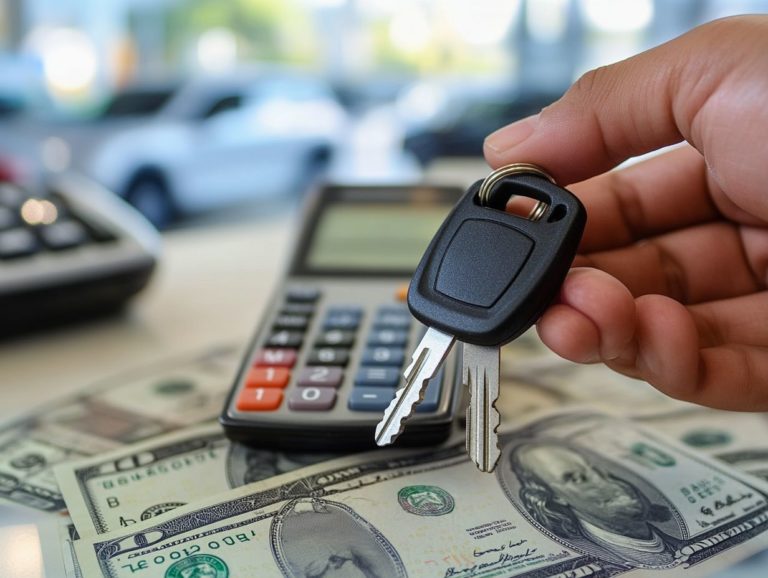Understanding the Total Cost of Car Ownership
Owning a car brings a unique blend of excitement and complexity. It s important to grasp the complete financial landscape.
Beyond just the initial purchase price, several factors play a significant role in determining the total cost of ownership. Depreciation, fuel efficiency, and maintenance expenses affect your budget.
This article provides a breakdown of these factors, showing how they influence your finances. You ll also discover practical tips for minimizing costs and explore alternative transportation options that align with your lifestyle.
Prepare to navigate the nuances of car ownership with assurance and clarity!
Contents
- Key Takeaways:
- The Basics of Car Ownership Costs
- Factors that Affect Car Ownership Costs
- Depreciation and Resale Value
- Fuel Efficiency and Maintenance
- Calculating the Total Cost of Car Ownership
- Tools and Methods for Estimating Costs
- Ways to Reduce Car Ownership Costs
- Alternative Transportation Options
- Frequently Asked Questions
- What is meant by ‘Total Cost of Car Ownership’?
- Why is it important to understand the Total Cost of Car Ownership?
- What are some common factors that contribute to the Total Cost of Car Ownership?
- Are there any hidden costs associated with car ownership?
- How can I estimate the Total Cost of Car Ownership?
- Are there ways to lower the Total Cost of Car Ownership?
Key Takeaways:

- The total cost of owning a car includes more than just the purchase price. Consider fuel efficiency, maintenance, and resale value.
- Depreciation affects how much your car is worth over time. A car with a high resale value can save you money later.
- You can calculate your total ownership costs using various tools. Don t forget to include extra costs like insurance and taxes.
The Basics of Car Ownership Costs
Understanding car ownership costs is crucial for anyone planning to buy a vehicle. This includes maintenance, insurance, hidden costs, fuel expenses, and depreciation rates.
In 2023 and 2024, the average total cost of ownership can significantly influence your financial planning. Understanding what to expect will help you make informed decisions about car financing and ownership.
What is Included in Total Cost of Ownership?
Total cost of ownership includes expenses like insurance, fuel, maintenance, repairs, depreciation, and hidden costs. Knowing these can help you budget effectively.
For example, while a Toyota Corolla might have lower insurance premiums than a Honda Accord, the fuel efficiency of hybrids or electric vehicles could lead to significant savings on fuel costs over time.
Routine maintenance and occasional repairs vary dramatically depending on the make and model. Luxury brands often demand higher upkeep costs. It s also essential to consider depreciation rates for new vehicles, as this impacts long-term value. By recognizing these factors, you can make informed decisions that align with your budget and financial aspirations.
Factors that Affect Car Ownership Costs
Key factors that influence car ownership costs include depreciation, fuel efficiency, maintenance, insurance rates, and financing options. Understanding these helps you manage your budget.
Comprehending these aspects empowers you to make informed decisions and effectively manage your budget.
Explore your options before making a purchase, and consider seeking further information on car ownership!
Depreciation and Resale Value

Depreciation is a key factor in determining your vehicle’s resale value. It reflects the decline in market value over time. This decline significantly impacts total car ownership costs and financing options.
By understanding how depreciation is calculated, you can enhance your decision-making process as a potential buyer. Typically, the rate of depreciation varies based on many factors, including the vehicle’s brand and type.
For example, brands known for their reliability, such as Kia and Nissan, often experience slower depreciation rates. This can be highly advantageous for your resale value after several years of ownership.
On the flip side, luxury vehicles can depreciate rapidly, potentially leading to unexpected financial losses. Factors like the car’s mileage, overall condition, and market demand play crucial roles in influencing these rates. By recognizing and evaluating these factors, you empower yourself to make informed choices when purchasing your next vehicle.
Fuel Efficiency and Maintenance
Fuel efficiency is a crucial factor in car ownership. It influences not just your fuel costs but also your overall maintenance expenses and long-term savings.
When considering how a vehicle performs over time, choosing an optimally fuel-efficient option can significantly lower your monthly payments by reducing your reliance on fuel. For example, drivers who opt for hybrids or compact cars often find that their costs at the pump are just the beginning of their savings.
These vehicles typically require less frequent oil changes and experience fewer wear-and-tear issues, making it easier for you to understand repair expenses and create a more predictable budget.
Selecting a model known for its longevity can also lead to lower ownership costs, as repairs are minimized. Therefore, investing in fuel-efficient vehicles isn t just a smart choice; it can yield substantial financial benefits in the long run.
Calculating the Total Cost of Car Ownership
Calculating the total cost of car ownership requires a thoughtful approach. Utilize various tools and methods to estimate your expenses with precision. By factoring in financing, maintenance, fuel costs, and insurance premiums, you can develop a comprehensive financial picture that reflects your investment in your vehicle.
Tools and Methods for Estimating Costs
You have a wealth of tools and methods at your disposal to estimate the costs associated with car ownership. This allows you to budget accurately for expenses like maintenance, insurance, fuel, and repairs.
For example, online calculators like Edmunds’ True Cost to Own and Kelley Blue Book’s Cost to Own offer comprehensive insights into ownership costs, considering factors such as depreciation, insurance rates, and fuel efficiency.
Mobile apps like Fuelly enable you to track your fuel consumption and costs, providing a clear picture of your monthly expenses. Budgeting apps like Mint help you manage all your financial commitments by categorizing expenses and alerting you when you exceed your set budgets.
These tools not only streamline the budgeting process but also equip you with valuable data, empowering you to make informed financial decisions.
Ways to Reduce Car Ownership Costs

Discovering smart ways to cut car ownership costs is crucial for budget-savvy drivers like you! This involves exploring avenues that tackle maintenance, insurance, and overall expenses, all while ensuring that you don t compromise on reliability or safety.
Tips for Saving on Maintenance and Insurance
Implementing effective strategies to save on maintenance and insurance can substantially ease the financial burden of car ownership. This allows you to maintain your vehicle in pristine condition while keeping expenses in check.
By prioritizing regular servicing, you extend your car’s lifespan and prevent costly repairs down the line. It’s wise to adhere closely to the manufacturer s maintenance schedule for optimal results.
Improving your credit score can lower your insurance premiums, simplifying the management of your overall costs. If you’re aiming to cut back even more, consider bundling your insurance policies. Combining auto and home coverage often yields significant discounts.
Take control of your expenses with these simple strategies to enjoy your vehicle without the stress of overwhelming costs.
Alternative Transportation Options
Exploring alternative transportation options presents you with substantial savings on ownership costs. These options offer viable solutions for anyone looking to reduce expenses linked to car ownership while effectively addressing their transportation needs.
Exploring Other Modes of Transportation
Alternative modes of transportation, like public transit and ridesharing, can be a smart way to save on ownership costs. They provide the flexibility and convenience you need to reach your destinations.
These options significantly lower your expenses related to fuel and maintenance. They also offer a stress-free way to travel, easing the burden of navigating traffic and searching for parking.
By opting for public transport solutions like buses and subways, you actively contribute to reducing carbon emissions, positively impacting the environment. This shift toward alternative transportation leads to improved air quality, benefiting urban communities as a whole.
Many cities are now investing in enhanced infrastructure to support these options. This boosts accessibility and encourages more individuals to adopt sustainable travel habits. Embracing these modes of transportation elevates your daily commute and aligns with a more eco-conscious lifestyle.
Frequently Asked Questions

What is meant by ‘Total Cost of Car Ownership’?
Total Cost of Car Ownership refers to the overall expenses associated with owning and maintaining a car over a certain period, including the initial purchase cost, taxes, insurance, registration fees, fuel, maintenance, and repairs.
Why is it important to understand the Total Cost of Car Ownership?
Understanding the Total Cost of Car Ownership helps individuals make informed decisions when purchasing a car. It allows them to consider all the expenses involved and choose a vehicle that fits within their budget.
What are some common factors that contribute to the Total Cost of Car Ownership?
Common factors include the type of car (fuel-efficient, luxury, etc.), the age of the car, driving habits, location, and insurance rates.
Yes, there can be hidden costs such as unexpected repairs, maintenance fees, and higher insurance premiums for certain types of cars. It is important to consider these potential expenses when calculating the Total Cost of Car Ownership.
How can I estimate the Total Cost of Car Ownership?
You can estimate the Total Cost of Car Ownership by adding up all the expenses associated with owning and maintaining the car. This includes the initial purchase cost and ongoing expenses like fuel, insurance, and maintenance fees. It may also be helpful to use online calculators or consult with a financial advisor.
Are there ways to lower the Total Cost of Car Ownership?
Yes, there are several ways to lower the Total Cost of Car Ownership. These include choosing a fuel-efficient vehicle, maintaining good driving habits, comparing insurance rates, and regular maintenance to prevent costly repairs. It is also important to negotiate the initial purchase cost of the car to get the best deal possible.
Ready to save? Start implementing these tips today!






